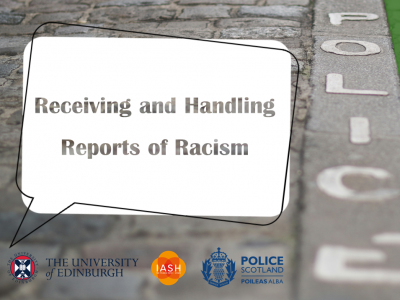
A guest blog by Dr Yarong Xie, Research Fellow 2022-24
In the past term, Dr Sue Widdicombe and I convened two knowledge exchange workshops with Police Scotland. This project was informed by my doctoral research, which investigates how people report racism in broadcast interviews (Xie, 2023a; 2023b) and online forums (Xie, forthcoming). Our aim was to better understand how racism is reported and handled on the ground by the police. As I learned early during my PhD and through the preparation for this project, although victims are encouraged to report racism, racial hate crimes remain largely under-reported. Yet much of the policing and forensic investigation depends heavily on these initial reports. Drawing on my findings, I showed how reports of racism are delivered turn by turn in conversations, and explored with police professionals how reports of racism might be handled more effectively.
The first workshop was held at Police Scotland’s premises in November 2024. We welcomed 26 officers and staff members, and engaged in 4 interactive sessions. The second workshop was delivered online in March 2025. Delegates were invited back for an in-depth discussion. Together we consolidated key insights from the first workshop and explored possibilities for future collaborations.
A key takeaway from the workshops is that receiving and managing reports of racism can be challenging because members of the public and the police may operate on different agendas. While a victim may be seeking help or protection, officers are required to fulfil an institutional duty – to gather accurate and detailed information and evidence. However, as my research shows, racism is often reported in an indirect or ambiguous manner, leaving the burden on the recipient to interpret or infer the nature of the offence. This lack of explicit detail can complicate communication between victims and officers, who may need to ask repetitive questions – perhaps on several occasions – to obtain a credible account. This way of communication may discourage members of the public from seeking help and reporting the incidents.
Using examples found in a TV documentary, I highlighted discursive practices that could help officers to engage with the victims and display empathy, whilst fulfilling their institutional tasks. Delegates found these demonstrations “very interesting”, “useful”, “great”, and some asked to see “a live call from… Police Scotland” or from “a local call centre”.
To generate more meaningful and impactful findings that can benefit the wider organisation (police forces across Scotland and the UK), we believe there is value in accessing and analysing anonymised reports of racial hate crimes/incidents made to the police. These discussions are still ongoing, but we hope these two workshops mark the beginning of sustained collaborations between conversation-analytic research and policing on racism.
To capture insights shared and generated from the workshops, we have published a comprehensive report which is available to view and download here: https://www.research.ed.ac.uk/en/projects/receiving-and-handling-reports-of-racism.
Finally, we are deeply grateful for the officers who took time out of their duty to join us in these meaningful conversations. We also extend our sincere gratitude to our colleagues in IASH for their incredible support in administering this project, and to the College of Arts, Humanities and Social Sciences for funding this project.
